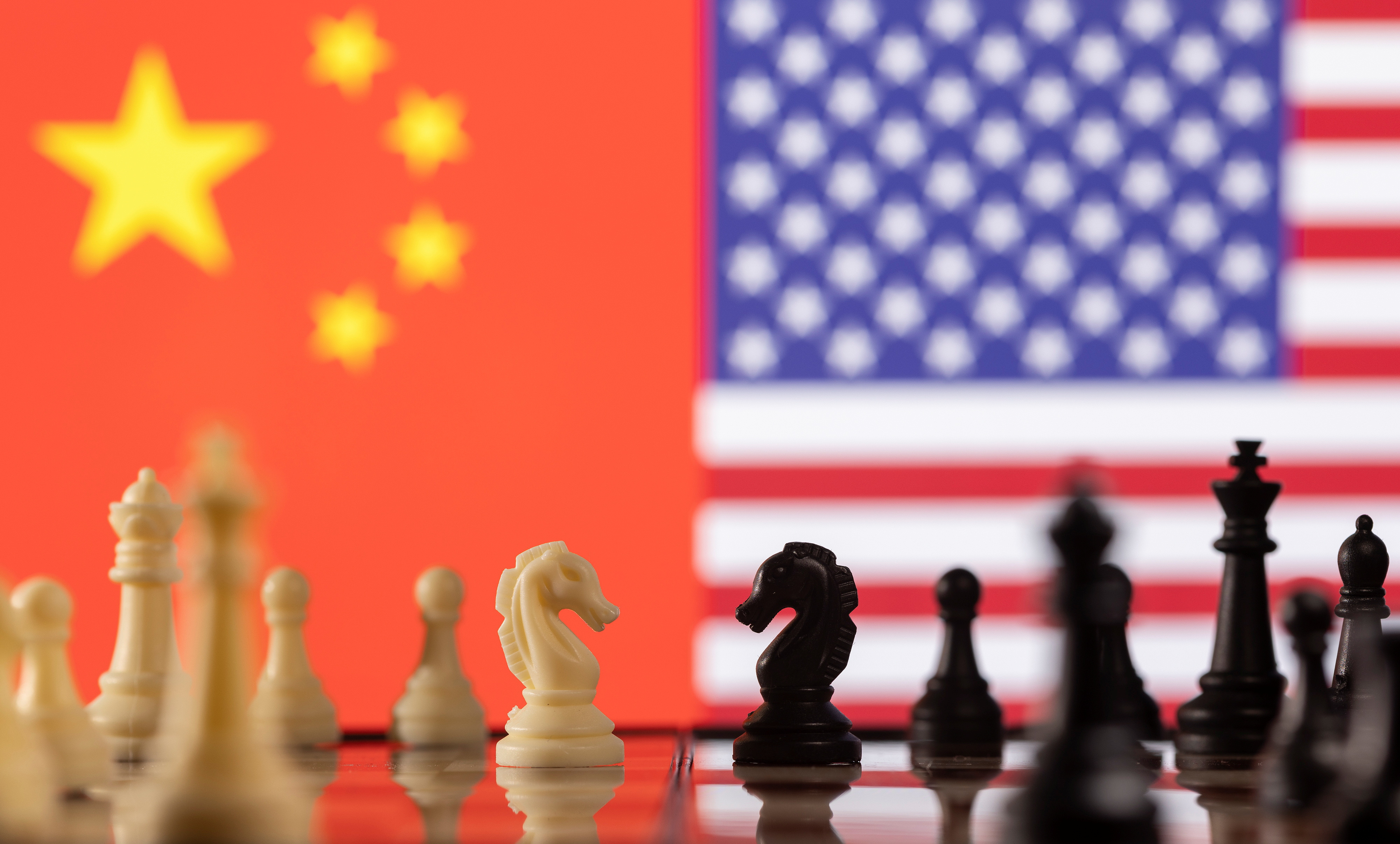Assessing The Feasibility Of A China-Canada Anti-US Alliance

Table of Contents
Geopolitical Motivations and Shared Concerns
The foundation of any alliance rests on shared interests and perceived threats. A China-Canada Anti-US alliance, however improbable, could theoretically stem from common concerns about specific US policies.
Canada's Concerns Regarding US Policies
Canada, while a close ally of the US, has experienced friction stemming from several key policy disagreements:
- Increased trade barriers imposed by the US: The imposition of tariffs and trade restrictions by the US has significantly impacted the Canadian economy, particularly sectors like lumber and agriculture. This has fueled a desire for trade diversification and reduced reliance on the US market.
- Disagreements on environmental policies (e.g., Keystone XL pipeline): The cancellation of the Keystone XL pipeline project exemplifies the divergence in environmental approaches between the two nations. This highlights the potential for conflict over resource management and environmental regulations.
- Differing approaches to international relations (e.g., withdrawal from international agreements): Canada's commitment to multilateralism contrasts with the US's recent trend toward unilateral action on issues such as climate change and international trade agreements. This divergence in foreign policy could push Canada to seek alternative partners.
These points demonstrate a growing unease in Canada regarding its dependence on the US and a growing need for alternative partnerships to ensure economic and political stability. Canada's diplomatic efforts to navigate these challenges, often involving quiet diplomacy and strategic maneuvering, illustrate the complexity of this relationship.
China's Strategic Interests and Global Ambitions
China's motivations for such an alliance are equally complex, driven by its broader geopolitical strategy:
- Counterbalancing US influence: China views the US as its primary geopolitical rival and seeks to diminish US influence globally. An alliance with Canada would provide a strategic foothold in North America, weakening US dominance.
- Securing access to North American resources and markets: Canada possesses abundant natural resources and a stable market, attractive to China's growing economy. An alliance could secure preferential access to these resources and expand Chinese economic influence.
- Expanding its Belt and Road Initiative: The Belt and Road Initiative aims to expand China's global influence through infrastructure development. Canada could become a crucial link in this initiative, providing access to North American markets and resources.
- Projecting power globally: An alliance with Canada would enhance China's global image and project its soft power, enhancing its international standing and influence.
China's long-term strategic goals clearly demonstrate a desire for global power projection and economic dominance. An alliance with Canada, though fraught with challenges, could offer a significant advantage in achieving these aims.
Economic Considerations and Trade Relations
Economic factors are crucial in assessing the feasibility of any alliance. The potential for a China-Canada Anti-US alliance hinges on a complex interplay of trade, investment, and economic interdependence.
Trade Interdependence and Diversification
- Canada's existing trade relationship with the US: The US remains Canada's largest trading partner, creating significant economic interdependence. Diversifying trade relationships is a key consideration for Canada.
- China's growing economic influence: China's expanding global trade influence presents an opportunity for Canada to reduce its dependence on the US.
- Potential for increased bilateral trade between Canada and China: Increased trade between Canada and China could offer economic benefits for both countries, but it could also lead to challenges if it comes at the expense of existing trade relationships.
- Risks associated with over-reliance on a single major trading partner: While diversifying trade is beneficial, over-reliance on any single partner, even China, carries significant economic risks.
A shift towards increased trade with China would require careful navigation to avoid upsetting the delicate balance of existing trade relationships and to mitigate potential economic risks.
Investment and Infrastructure Projects
- Chinese investment in Canadian infrastructure: China has already invested significantly in Canadian infrastructure projects. An alliance could lead to further investment, bolstering the Canadian economy.
- Potential for joint ventures and technological collaboration: Collaboration on infrastructure projects could foster technological exchange and innovation.
- Concerns about economic dependency and national security: Increased Chinese investment raises concerns about potential economic dependency and potential threats to national security.
Balancing economic benefits with national security concerns would be a critical challenge in any strengthened relationship between Canada and China.
Internal Political and Social Factors
The domestic political landscapes of both Canada and China significantly influence the feasibility of an alliance.
Public Opinion and Domestic Politics in Canada
- Canadian public opinion on China: Canadian public opinion on China is complex, with concerns about human rights and political freedoms often outweighing economic benefits.
- Concerns about human rights in China: Human rights violations in China pose a significant ethical challenge for Canada, potentially hindering public support for a closer alliance.
- Impact of political alliances on domestic policy: A shift towards closer ties with China could have significant domestic political implications and trigger intense debate.
- Potential opposition from within Canada: Strong opposition within Canada to closer ties with China is likely, creating significant political hurdles.
Navigating domestic political opposition and addressing public concerns will be crucial for any Canadian government considering a closer relationship with China.
Political Stability and Regime Type
- Differences in political systems: The fundamental differences between Canada's democratic system and China's authoritarian regime present significant challenges for policy coordination and long-term stability.
- Potential challenges in coordinating policies and strategies: Divergent political ideologies and governance structures could lead to difficulties in reaching consensus on shared goals and strategies.
- Challenges of maintaining a long-term stable relationship between democracies and authoritarian regimes: Historically, alliances between democracies and authoritarian regimes have proven unstable, adding further challenges to the prospect of a China-Canada alliance.
International Implications and Global Response
A China-Canada Anti-US alliance would have significant global repercussions.
Reactions from the US and other Allies
- Potential for increased US sanctions and pressure: The US is likely to respond negatively to such an alliance, potentially imposing sanctions or other forms of pressure on Canada.
- Reactions from other countries in the region: Other countries in North America and beyond would likely react to a China-Canada alliance, potentially shifting regional alliances and power dynamics.
- Impact on international organizations and alliances: The alliance could significantly impact international organizations like NATO and the G7, potentially weakening their cohesion and effectiveness.
Implications for Global Security and Stability
- Shift in global power dynamics: Such an alliance could significantly alter the global balance of power, potentially escalating geopolitical tensions and increasing the risk of conflict.
- Potential impact on regional conflicts: The alliance could influence the dynamics of regional conflicts, potentially exacerbating tensions or creating new points of conflict.
- Consequences for international cooperation: The alliance could undermine international cooperation on issues like climate change, trade, and security, further destabilizing the global order.
Conclusion
The feasibility of a China-Canada Anti-US alliance is highly questionable. While shared concerns and economic incentives might present certain motivations, significant obstacles—including domestic political constraints, differing political systems, and potential international repercussions—render such an alliance highly improbable. Ultimately, understanding the complexities surrounding the potential for a China-Canada Anti-US Alliance requires a nuanced analysis of the numerous political, economic, and social factors at play. Further research is needed to fully explore the intricate dynamics of this unlikely geopolitical scenario. A deeper understanding of the potential benefits and drawbacks is crucial for navigating the complex relationship between Canada, China, and the United States in the years to come.

Featured Posts
-
 Melissa Morton Garden Designer At The Harrogate Spring Flower Show
Apr 25, 2025
Melissa Morton Garden Designer At The Harrogate Spring Flower Show
Apr 25, 2025 -
 Extreme V Mware Price Hike At And T Highlights 1 050 Cost Increase From Broadcom
Apr 25, 2025
Extreme V Mware Price Hike At And T Highlights 1 050 Cost Increase From Broadcom
Apr 25, 2025 -
 Broncos 2024 Draft Espns Projected Slam Dunk Selection
Apr 25, 2025
Broncos 2024 Draft Espns Projected Slam Dunk Selection
Apr 25, 2025 -
 2025 Anzac Day Guernsey Unveiled A New Design Revealed
Apr 25, 2025
2025 Anzac Day Guernsey Unveiled A New Design Revealed
Apr 25, 2025 -
 Parents Applauded Sherwood Ridge Primary Schools Inclusive Anzac Day Policy
Apr 25, 2025
Parents Applauded Sherwood Ridge Primary Schools Inclusive Anzac Day Policy
Apr 25, 2025
Latest Posts
-
 Climate Change And Africas Workforce Adapting To The Green Transition
Apr 26, 2025
Climate Change And Africas Workforce Adapting To The Green Transition
Apr 26, 2025 -
 Le Labo Du 8 Une Exposition Photographique De Pierre Terrasson
Apr 26, 2025
Le Labo Du 8 Une Exposition Photographique De Pierre Terrasson
Apr 26, 2025 -
 Milan Design Week 2025 Saint Laurent Showcases The Legacy Of Charlotte Perriand
Apr 26, 2025
Milan Design Week 2025 Saint Laurent Showcases The Legacy Of Charlotte Perriand
Apr 26, 2025 -
 Exposition De Photos De Pierre Terrasson A La Galerie Le Labo Du 8
Apr 26, 2025
Exposition De Photos De Pierre Terrasson A La Galerie Le Labo Du 8
Apr 26, 2025 -
 Saint Laurent And Charlotte Perriand A Milan Design Week 2025 Collaboration
Apr 26, 2025
Saint Laurent And Charlotte Perriand A Milan Design Week 2025 Collaboration
Apr 26, 2025
